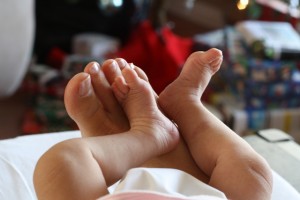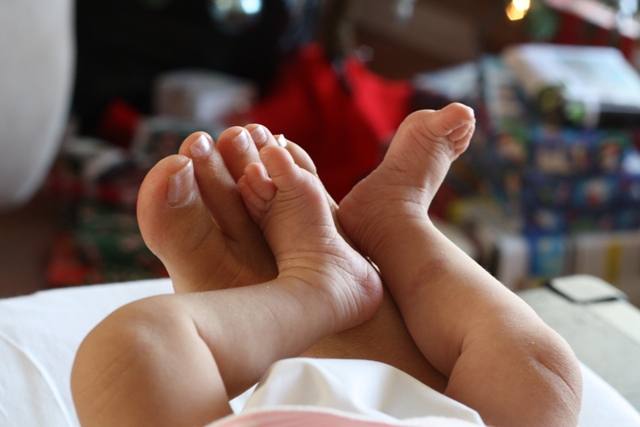Throughout this first month of motherhood, I’ve been reflecting on what I wish someone had told me about beforehand. It might not have changed anything, but I guess it would have been nice to have known some of these things. Everyone’s experience is different, but I thought I’d try to write mine down in case someone else might benefit from my hard-learned lessons.
 1. Once your water breaks, you will leak until the baby is born.
1. Once your water breaks, you will leak until the baby is born.
I had been under the impression that the water breaking was one big gush and then nothing else. (After all, that’s how it is in all the movies…) How wrong I was! The body continues generating amniotic fluid for as long as the baby is in utero, so a break in the membrane simply means non-stop leaking (like peeing all day continuously). Alena was born 23 hours after my amniotic sac ruptured and I went through maxi pads very quickly.
2. Getting stitched up and the afterbirth is more unpleasant than the labour contractions.
Labour contractions have a rhythm. They begin, slowly crest, climax and wane. Getting stitched up afterward (I had a second degree tear) felt like getting poked and prodded at the doctor’s whim. They do give you local freezing but for some reason, I still felt it. Before labour, someone had said that by the time the afterbirth and stitches happen, you’ll be so consumed with the baby that you won’t notice a thing. That was not true for me.
3. No matter how much you insist against it, people WILL buy you baby clothes.
And if your baby is a girl, the clothes WILL be pink. Enough said.
4. The pain does not end with labour. Postpartum is full of pain too.
I was forewarned about the tiredness after labour but not the pain. I wasn’t ready for the feeling of being hit by a bowling ball in the abs and ribcage for three days afterward. And I hadn’t expected that it would hurt to sit and stand as the stitches healed. Nor did I know that my upper back would get so sore from bending over and holding 7 pounds of baby all day. Breastfeeding also came with another set of pain (even though they say it shouldn’t be painful…). As I write this (four weeks after the birth), I’m still waiting to be pain-free.
5. You go through tons of feminine pads, nursing pads, toilet paper, paper towels and hand soap.
To prevent infection, I went through feminine pads and nursing pads like no tomorrow. And since we had lots of family and visitors come through our place, essentials such as toilet paper, hand soap and paper towels disappeared rather quickly too. I’m glad I had the foresight to stock up on most of these items beforehand.
6. You might buy stuff almost every day at the beginning.
The first week of Alena’s life, we had to buy something pretty much every day. The learning curve is steep as you figure out what your particular baby needs. For example, even though we’d chosen to go with a cloth diaper service and the cloth diapers were ready for us to use, we realized that it was best to go with disposables until her umbilical stump fell off (the cloth ones went too far up her waist). So off to the store we went for disposable diapers. And a few days in, we decided to rent a breast pump because it was too painful for me to breastfeed Alena. Along with that, we had to buy pump related items as well as bottle-feeding equipment. Each day brought a new set of needs it seemed. The gift money we received before her birth really came in handy.
7. When visitors call to ask if they can visit, you can call them back with an answer.
There was one afternoon when my parents’ friends called and said they were coming over right away to visit. Tim and I had already invited our own friends over. It ended up being a very tiring afternoon for us. In retrospect, we could have told our parents’ friends we’d call them back with an answer instead of feeling pressured to let them come just because they said they were coming. I also learned to let my voicemail take any unknown calls. Because I’d signed up for a bunch of free stuff before Alena was born, I ended up getting a lot of ad calls in the first couple weeks after she was born. I learned pretty quickly not to answer any toll-free or blocked ID callers.
8. The first few weeks are a multi-layered challenge – especially for the mother.
Sleep-deprivation is a given. But in addition to fatigue, there is physical recovery (it just takes longer to sit down, or walk, or use the bathroom, etc.). And on top of that, there’s learning about your baby and essentials like changing diapers, feeding, clothing, and calming her. Add to that inter-personal tensions that might arise from having guests and family around. And if you’re introverted like I am, there’s the “too many people every day” factor – even though it’s nice to have help with cooking, cleaning and caring for the baby, the other side of the coin is that people are draining and it’s hard to really rest when the house is full of people (and by “full”, I mean two extra people). And if all this wasn’t enough, there’s the adjustment between husband and wife. Oh, and did I mention the emotional roller coaster thanks to swinging hormones and all of the above? Realizing the scope of the challenge and having friends and trusted people to talk to helped me cope and get through the first few weeks.
9. The books and classes present ideals, averages and “norms”; the reality is that you make decisions based on what is best for your given situation.
As an idealist, I really struggled to give myself grace in this area. From deciding to take some drugs to ease the pain during labour (I had hoped to go drug-free), to pumping breastmilk (I’d hoped to breastfeed directly), to giving Alena formula for a couple days as I transitioned to pumping (I’d hoped to feed her exclusively breastmilk), I learned to see my choices not as compromises, but as making the best decision possible for my particular circumstances.
10. It takes a lot of intention to keep laughing, having fun and remembering to tell your spouse and baby you love them.
The first few weeks are rough. But they are a transition period. (That’s what people keep telling me anyway.) I really doubt that Alena will remember what kind of diapers we used or whether her sheets were clean. But I suspect she will always be impacted by whether she felt loved and whether our home was a place of joy and safety in these early days. It’s easy to forget what really matters or become resentful toward the baby when you feel overwhelmed by all the changes and life just feels like one long night. So I’ve learned to remind myself to tell Tim and Alena that I love them at least once every day. And to take moments to simply enjoy my baby and smile.
